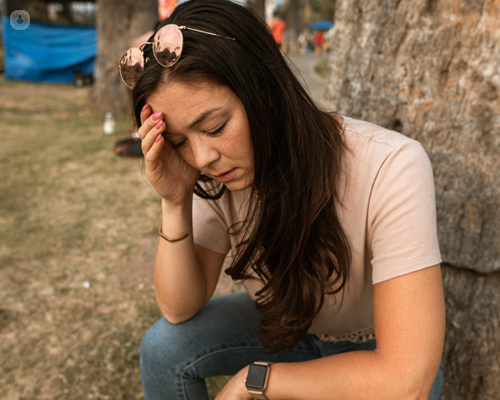Demystifying psychosomatic disorders
Written by:Psychosomatic disorders may have been taken less seriously by some medical professionals in the past. Thankfully, advancements in scientific knowledge has meant that those misunderstandings are now evolving into considered research and responses to how the mind can affect our physical health, and vice versa.
Top Doctors speaks to leading psychologist Dr Daniela Rossi about psychosomatic disorders in detail, looking at causes, diagnosis and treatment.

What are psychosomatic disorders?
Psychosomatic disorders are somatic illnesses caused or exacerbated by:
- Distress, such as bereavement
or;
- Chronic stress due to bullying, discrimination, unemployment, relationship difficulties, or similar.
When stress occurs in an individual who is more emotionally and physiologically reactive, this may cause wear and tear on the body due to physiological changes related to the stress reaction.
An example of a psychosomatic illness is a psychosomatic cardiovascular disease or irritable bowel syndrome.
Although brief episodes of acute stress can generally be healthy and well-tolerated by most individuals with genetic and other susceptibilities, chronic stress can have a harmful effect resulting in psychosomatic symptoms and disorders. Different vulnerabilities in individuals make them more prone to different psychosomatic conditions.
What causes psychosomatic disorders?
Although the exact cause for the evolution of psychosomatic disorder is unknown, studies show that physiological stress-reaction can cause physical conditions due to the hyperactivity of the autonomic nervous system over a prolonged period.
The Autonomic Nervous System (ANS) is the part of the nervous central system (NCS) that regulates the functions of the internal organs. The biggest challenge science faces is finding out whether emotional distress causes somatic symptoms, somatic symptoms cause emotional pain, or if a multisystem condition causes both.
A further difficulty is that, albeit it's known that many stress-related factors can trigger psychosomatic disorders, the complexity of the relationship between the brain and the body and the uniqueness of individuals' biological heterogeneity makes it difficult to isolate the causes. In addition to this, recent studies have focused on the microbiome, or the relationships between the microorganism in our body and the immune system, showing that many psychosomatic conditions are infections facilitated by a compromised immune system.
In summary, whilst historically there has been a tendency to label medically-unexplained symptoms as being 'psychosomatic or all in the mind symptoms’, somehow implying that these were 'not real', the list of these conditions has kept on shrinking as scientific knowledge has advanced.
Diagnosis
The diagnosis of a psychosomatic condition requires a thorough psychiatric assessment to ascertain whether there is a psychological or psychiatric pathophysiological process that would explain a symptom.
Treatment of psychosomatic symptoms
The goal of psychosomatic disorders treatment is to improve the individual's symptoms and ability to function in daily life. Treatment is usually in the form of psychological and or occupational therapy. Sometimes, medications for anxiety and depression can also help to manage symptoms because individuals suffering from psychosomatic conditions tend to show increased sensitivity to pain.
Displaying psychosomatic symptoms? Make a visit to Dr Rossi's office for expert understanding and assistance. Visit her Top Doctors profile to make an appointment.


